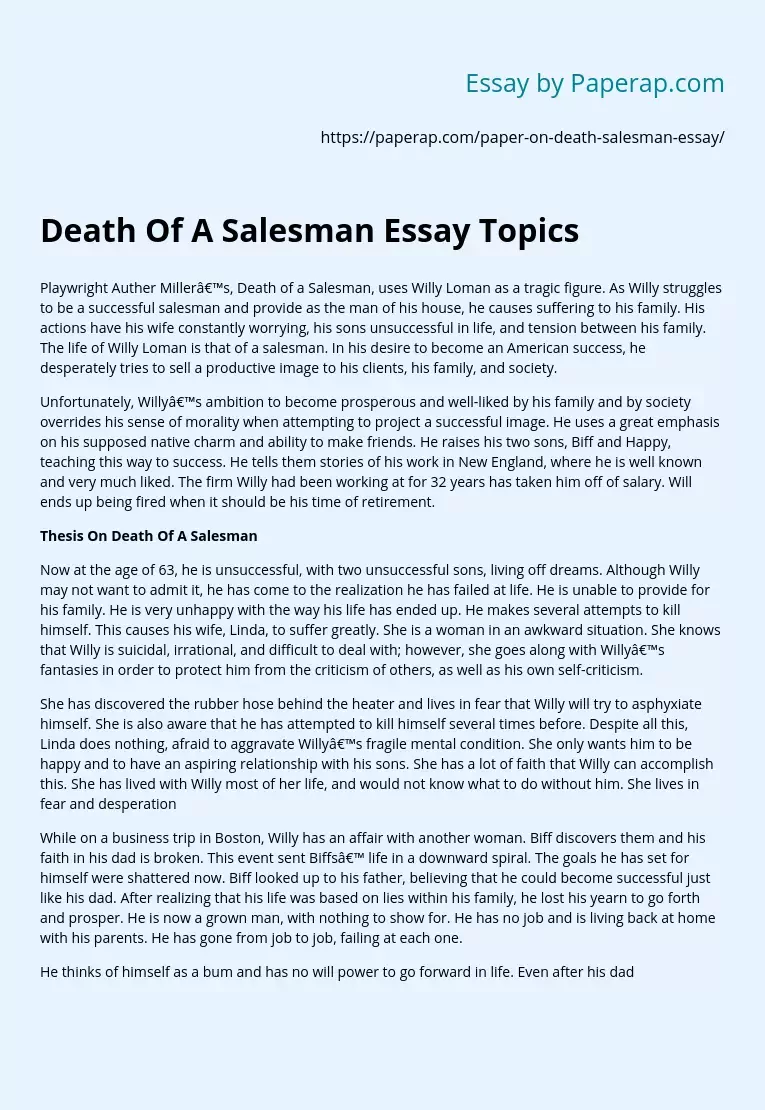Willie Lohman in the novel Death of a Salesman by playwright Other Miller
Playwright Auther Miller’s, Death of a Salesman, uses Willy Loman as a tragic figure. As Willy struggles to be a successful salesman and provide as the man of his house, he causes suffering to his family. His actions have his wife constantly worrying, his sons unsuccessful in life, and tension between his family. The life of Willy Loman is that of a salesman. In his desire to become an American success, he desperately tries to sell a productive image to his clients, his family, and society.
Unfortunately, Willy’s ambition to become prosperous and well-liked by his family and by society overrides his sense of morality when attempting to project a successful image. He uses a great emphasis on his supposed native charm and ability to make friends. He raises his two sons, Biff and Happy, teaching this way to success. He tells them stories of his work in New England, where he is well known and very much liked.
The firm Willy had been working at for 32 years has taken him off of salary. Will ends up being fired when it should be his time of retirement.
Now at the age of 63, he is unsuccessful, with two unsuccessful sons, living off dreams. Although Willy may not want to admit it, he has come to the realization he has failed at life. He is unable to provide for his family. He is very unhappy with the way his life has ended up. He makes several attempts to kill himself. This causes his wife, Linda, to suffer greatly.
She is a woman in an awkward situation. She knows that Willy is suicidal, irrational, and difficult to deal with; however, she goes along with Willy’s fantasies in order to protect him from the criticism of others, as well as his own self-criticism.
She has discovered the rubber hose behind the heater and lives in fear that Willy will try to asphyxiate himself. She is also aware that he has attempted to kill himself several times before. Despite all this, Linda does nothing, afraid to aggravate Willy’s fragile mental condition. She only wants him to be happy and to have an aspiring relationship with his sons. She has a lot of faith that Willy can accomplish this. She has lived with Willy most of her life, and would not know what to do without him. She lives in fear and desperation.
While on a business trip in Boston, Willy has an affair with another woman. Biff discovers them and his faith in his dad is broken. This event sent Biffs’ life in a downward spiral. The goals he has set for himself were shattered now. Biff looked up to his father, believing that he could become successful just like his dad. After realizing that his life was based on lies within his family, he lost his yearn to go forth and prosper. He is now a grown man, with nothing to show for. He has no job and is living back at home with his parents. He has gone from job to job, failing at each one.
He thinks of himself as a bum and has no will power to go forward in life. Even after his dad has built him up to be a boy who could be great. He has no desire to become something worthy and lives struggling. Willy applies an immense amount of pressure on his boys to be successful. Happy Loman is the younger son of Willy Loman. As stated earlier, he builds Biff up to be an incredible boy who can do incredible things. Happy, however, has always been the “second son”. Happy tries to be on Willy’s good side and keep him happy, even if it means perpetuating the lies and illusions that Willy lives in.
Happy Loman is seemingly content and successful, with a steady career and none of the obvious marks of failure that his older brother displays. Happy, however, is not content with his more stable life, because he has never risked failure or striven for any real measure of success. Happy is a compulsive womanizer who treats women purely as sex objects and has little respect for the many women whom he seduces. He works as an assistant but exaggerates his position and his authority. Happy is also unsuccessful, living an unhappy life.
He is trying to pleas his dad, when really his dad is just causing him to suffer. As a tragic hero, Willy is both the bane yet the central axis of his family with whom he is unable to connect and form significant relationships. His delusions lead too much of the tragic perception of him as it appears only Willy is unable to see how unrealistic his perceptions of life and success really are. He is an unwillingness to submit passively to the established order and values. He even commits suicide in his last attempt to provide money which all ends to Biff’s success.
His result of an individual’s quest for personal dignity occurs when an individual attempts to evaluate existence justly. He again becomes a tragic hero as his downfall does not live up to his original delusions but instead favors his family with “freedom”. This is something they all wished for while he was alive. In Willy’s descent, there is a tragic paradox; for as he moves towards inevitable destruction, he acquires that knowledge, that sense of reconciliation, which allows him to conceive a redemptive plan for his house.
Willie Lohman in the novel Death of a Salesman by playwright Other Miller. (2019, Dec 05). Retrieved from https://paperap.com/paper-on-death-salesman-essay/

